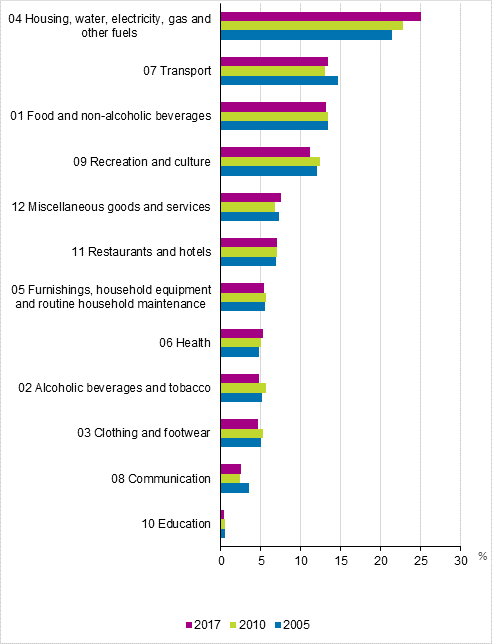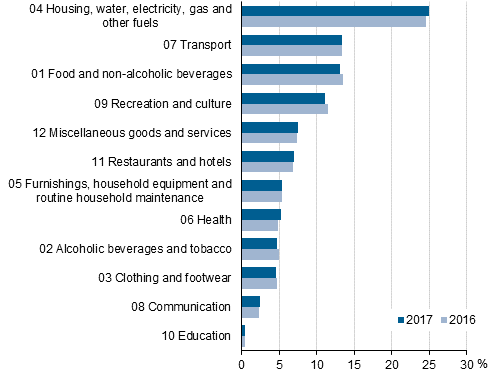Weight structure and commodity basket of the Consumer Price Index were updated
Weight structure
The weight structure of the Consumer Price Index 2015=100 is based on national accounts data on private consumption. The data are updated annually. The weight structure for 2017 corresponds to the value of private consumption in 2016, which was EUR 102 billion.
National accounts data on consumption expenditure are only available at a rough level. To the extent that the division of consumption items is not accurate enough, the weight of the sum level is divided into sub-items, primarily with the help of the Household Budget Survey. In addition, sub-items are defined by using statistical data produced by other statistics, the Bank of Finland's statistics and sales data of central corporations and units.
The weights of the Consumer Price Index are composed of the value of goods and services bought by households in Finland. Households also include the consumption of tourists in Finland and institutional households. The concept of private consumption in the Consumer Price Index differs from the concepts used in national accounts and the Household Budget Survey and its coverage is also different. Further information about consumption of the Consumer Price Index can be found in Consumer Price Index 2015=100 Handbook for users, p. 9.
Figure 1. Value shares of total consumption by commodity group in 2005, 2010 and 2017, per cent of total consumption

In the figure, a comparison is made between two base years and the most recent year. Group 04 Housing, water, electricity, gas and other fuels has had the biggest weight values in the past ten years. Group 01 Food and non-alcoholic beverages has been the second biggest target of private consumption for the last seven years measured by the value share of consumption, but now the group had to step back to third place behind group 07 Transport.
Commodity basket
The index follows the price development of representative commodities, so new commodities are added to the commodity basket. In addition, commodities whose weight is under one per mil of total consumption are removed from the basket. With the help of annually updated commodities and weights, the representation of typical commodities in the Index is ensured. Previously, the weight structure of the Consumer Price Index was updated every five years.
In 2016, an updated commodity classification was taken into use in the Consumer Price Index (eCOICOP, European Classification of Individual Consumption According to Purpose). The commodity classification is based on the UN's Classification of Individual Consumption According to Purpose, from which a commodity classification was formed for the use inside the EU. In the latest update, the commodity classification was specified to the 5-digit level, for which reason Finland's commodity basket was also renewed and the classification coding was updated.
From the beginning of 2017, painting tools and hiking backpack were added to the commodity basket. Due to low consumption, products and services removed from the commodity basket included products such as beef strips, frozen game meat, lure, sleeping bag and digital television adaptor, and the services included book club and hire of movie.
After the update, the commodity basket contains 469 products and services.
Figure 2. Weight structure comparison of Consumer Price Index 2015=100 by commodity group, per cent of total consumption

The biggest change in the weight structure of the index compared to the year before was the growth in the share of group 04 Housing, water, electricity, gas and other fuels. Changes in the prices of commodities in this group have now more effect on the Consumer Price Index than before. Correspondingly, as a result of the drop in the weight share of commodities in group 01 Food and non-alcoholic beverages, the changes in these prices have less effect on changes in the Consumer Price Index.
Weight structure of the Harmonised Index of Consumer prices was also updated
Statistics Finland has also updated the weight structure of the Harmonised Index of Consumer Prices calculated for Eurostat, the Statistical Office of the European Communities. Its base year is the same as that of the national Consumer Price Index, 2015=100.
The Harmonised Indices of Consumer Prices are primarily used in price comparisons between the EU countries. The European Central Bank uses the Harmonised Index of Consumer Prices as the measure of inflation in its monetary policy.
The Finnish Harmonised Index of Consumer Prices is mainly based on the same weight and price data as the Finnish national Consumer Price Index, but its commodity selection is narrower. It does not include owner-occupancy, games of chance, interests and tax-like payments. The Harmonised Index of Consumer Prices covers under 90 per cent of the national Consumer Price Index.
Table 1. Consumption items removed from the Harmonised Index of Consumer Prices and their weights in the Consumer Price Index 2015=100 in 2017
| COICOP code | Commodity/group | Weight in the CPI, o/o |
| 04.6 | Owner-occupied housing | 10.92 |
| 07.2.4.2.1.1 | Vehicle tax | 1.16 |
| 09.4.3 | Games of chance | 1.94 |
| 12.5.2.0.1.2 | Premium for fire insurance on detached houses | 0.10 |
| 12.6.2.1.1.2 | Interests on consumer credits | 0.93 |
| 12.7.0.1.1.2 | Other licences | 0.05 |
| Items removed from HICP, total | 15.10 | |
Source: Consumer Price Index, Statistics Finland
Inquiries: Ilkka Lehtinen 029 551 3478, Kristiina Nieminen 029 551 2957, khi@stat.fi
Director in charge: Ville Vertanen
Updated 20.2.2017
Official Statistics of Finland (OSF):
Consumer price index [e-publication].
ISSN=1799-0254. January 2017,
Weight structure and commodity basket of the Consumer Price Index were updated
. Helsinki: Statistics Finland [referred: 18.7.2024].
Access method: http://www.stat.fi/til/khi/2017/01/khi_2017_01_2017-02-20_kat_001_en.html

